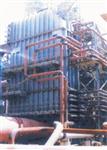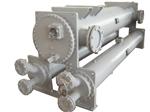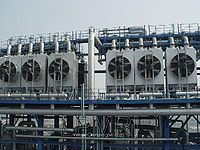Difference between revisions of "Heat Transfer Equipment"
| Line 1: | Line 1: | ||
[[Category:Heating]]{{Knoppen}} | [[Category:Heating]]{{Knoppen}} | ||
[[File:Heat Transfer Equipments_1.jpg|thumb|200px|right|Heat Transfer | [[File:Heat Transfer Equipments_1.jpg|thumb|200px|right|Heat Transfer Equipment: Boiler]] | ||
[[File:Heat Transfer Equipments_2.jpg|thumb|200px|right|Heat Transfer | [[File:Heat Transfer Equipments_2.jpg|thumb|200px|right|Heat Transfer Equipment: Shell and Tube Type]] | ||
[[File:Heat Transfer Equipments_3.jpg|thumb|200px|right|Heat Transfer | [[File:Heat Transfer Equipments_3.jpg|thumb|200px|right|Heat Transfer Equipment: Fans]] | ||
'''Heat Transfer Equipment''' or [[Heat Exchangers]] simply exchange heat and involves in heat transfer. Fluids or gases are introduced inside the shell side nozzle inlet. Fluids or gases then go through the shell moving through a series of baffles that guides its progress until it finally reaches the shell side outlet. Meanwhile another fluid or gas with a different temperature is pushed through the tube side inlet of the tube bundle. It then comes out of the tube side outlet. As simple as this process sounds, it is not simple to create. All tolerances for design, workmanship and nondestructive testing are strictly followed. | '''Heat Transfer Equipment''' or [[Heat Exchangers]] simply exchange heat and involves in heat transfer. Fluids or gases are introduced inside the shell side nozzle inlet. Fluids or gases then go through the shell moving through a series of baffles that guides its progress until it finally reaches the shell side outlet. Meanwhile another fluid or gas with a different temperature is pushed through the tube side inlet of the tube bundle. It then comes out of the tube side outlet. As simple as this process sounds, it is not simple to create. All tolerances for design, workmanship and nondestructive testing are strictly followed. | ||
Latest revision as of 00:11, 18 February 2013
Heat Transfer Equipment or Heat Exchangers simply exchange heat and involves in heat transfer. Fluids or gases are introduced inside the shell side nozzle inlet. Fluids or gases then go through the shell moving through a series of baffles that guides its progress until it finally reaches the shell side outlet. Meanwhile another fluid or gas with a different temperature is pushed through the tube side inlet of the tube bundle. It then comes out of the tube side outlet. As simple as this process sounds, it is not simple to create. All tolerances for design, workmanship and nondestructive testing are strictly followed.
Common Areas of Applications
- Process Heaters, Heater Revamp
- Heat Recovery Steam Generators
- Waster Heat Recovery Units
- Simple Cycle Catalyst Systems
Common Types
Shell and Tube Type Heat Exchanger
Shell and tube type heat exchanger (condenser and evaporator) is used for industrial and commercial air conditioning, refrigeration and freezing systems.
Exhaust Heat Boilers
Exhaust heat boilers series use the exhausted heat created during industrial process to generate steam. They are widely applicable in those fields such as chemical, petroleum, cement, metallurgy, pipe making, glass, porcelain enamel, etc.
Air Coolers
Air coolers are suitable for such trades as the oil refining , petroleum , chemical industry , hydropower station , metallurgy ,etc. mainly. High to have intensity, rigidity is good, it is with high efficiency to cool, corrosion-resistant, the advantage such as being little of the air resistance
Video


